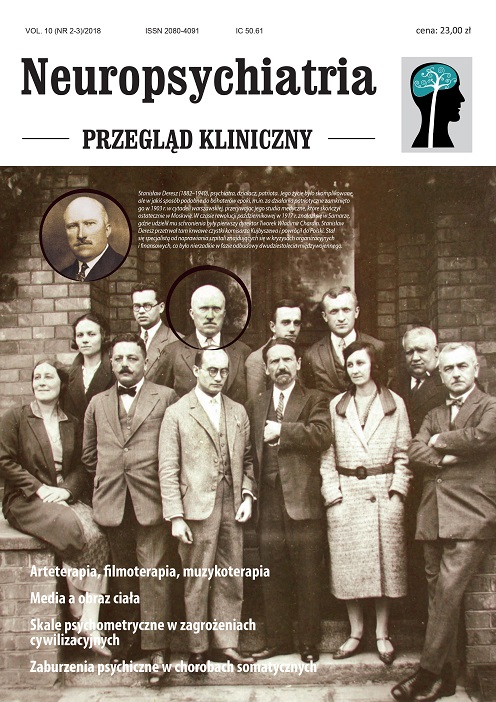Telemedicine scales in the study of the psychopathological phenomena related to civilization crisis. IT project. Scales of workaholism, chronic fatigue, burnout, job burnout, stress at work and depressive symptoms Review article
Main Article Content
Abstract
The article describes the implementation of an scientific grant (RPMA.01.02.00-14-5594/16) to create a set of telemedical scales referring to the description of phenomena referred to in the literature as the civilization syndrome, i.e. disorders related to the modern lifestyle. A team of related measuring tools has been created to assess workaholism, chronic fatigue, burnout, job burnout, stress at work and the severity of depressive symptoms.
Article Details

This work is licensed under a Creative Commons Attribution-NonCommercial-NoDerivatives 4.0 International License.
Copyright: © Medical Education sp. z o.o. License allowing third parties to copy and redistribute the material in any medium or format and to remix, transform, and build upon the material, provided the original work is properly cited and states its license.
Address reprint requests to: Medical Education, Marcin Kuźma (marcin.kuzma@mededu.pl)
References
2. Waligórska M, Nowak L. Prognoza ludności Polski na lata 2008-2035. Główny Urząd Statystyczny, Departament Badań Demograficznych, Warszawa 2008.
3. GUS 2014. Sytuacja demograficzna osób starszych i konsekwencje starzenia się ludności Polski w świetle prognozy na lata 2014-2050. Warszawa 2014.
4. NIK. Online: nik.gov.pl .
5. Kałuża-Kopias D. Osoby po pięćdziesiątym roku życia jako grupa w szczególnej sytuacji na rynku pracy. W: Kantowicz E, Orzechowska G (red). Zagrożone człowieczeństwo. T. II: Obszary zagrożeń człowieka w realiach współczesności. Impuls, Kraków 2012: 193-206.
6. Szweda-Lewandowska Z. Rynek usług opiekuńczych – perspektywy rozwoju w kontekście starzenia się populacji. Optimum, Studia ekonomiczne 2014; 68(2): 148-157.
7. Senat RP. Starzenie się społeczeństwa polskiego i jego skutki. Kancelaria Senatu, 2011.
8. Zakład Ubezpieczeń Społecznych. Wydłużony okres aktywności zawodowej pracowników 50+ a warunki pracy z uwzględnieniem obszarów, w których występuje zwiększone ryzyko wypadków przy pracy i chorób zawodowych oraz zagrożeń powodujących obniżenie zdolności do pracy .
9. Eurostat Press Office. Employment rate of people aged 20 to 64 in the EU up to 69.2% in 2014. Eurostat New Release 81/2015 – 7 May 2015.
10. Lange M. Rynek pracy w obliczu starzenia się ludności Polski. W: Kowaleski JT, Szukalski P (red). Starzenie się ludności Polski – między demografią a gerontologią społeczną. Wydawnictwo UŁ, Łódź 2008: 49-70.
11. Stoyanova R, Harizanova S. Economic losses caused by burnout syndrome among prison personnel in Bulgaria. International Journal of Health Economics 2013, 3.
12. Chrysopoulos P. OECD: Greeks are Hardest Working People in Europe .
13. Raphael TJ. Singles now outnumber married people in America. Lifestyle & Belief, 14.09.2014. Wersja: 30.07.2015.
14. Olfson M, Blanco C, Marcus SC. Treatment of adult depression in the United States. JAMA Intern Med 29.08.2016.
15. Hansen T, Slagsvold B. Late-Life Loneliness in 11 European Countries: Results from the Generations and Gender Survey. Social Indicators Research 2016; 129(1): 445-464.
16. Policja.
17. Björntorp P. Visceral obesity: a „civilization syndrome”. Obes Res 1993; 1(3): 206-222.
18. Simon K. Civilization stress, cardiovascular risk, evidence-based medicine, guidelines. Orv Hetil 2009; 150(19): 895-902.
19. Polska Agencja Prasowa, 21.01.2016
20. OECD. Temporary employment 2013.
21. OECD. Average annual hours actually worked per worker 2015.
22. OECD. Part-time employment rate 2013.
23. OECD Employment Outlook 2014.
24. Leist AK, Hessel P, Avendano M. Do economic recessions during early and mid-adulthood influence cognitive function in older age? J Epidemiol Community Health 2014; 68(2): 151-158.
25. Marquié JC, Tucker P, Folkard S et al. Chronic effects of shift work on cognition: findings from the VISAT longitudinal study. Occup Environ Med 2015; 72(4): 258-264.
26. Simpson NS, Banks S, Arroyo S et al. Effects of sleep restriction on adiponectin levels in healthy men and women. Physiol Behav 2010; 101(5): 693-698.
27. Salo P, Oksanen T, Sivertsen B et al. Sleep disturbances as a predictor of cause-specific work disability and delayed return to work. Sleep 2010; 33(10): 1323-1331.
28. Lollar J. Heart attacks rise following daylight saving time. UAB News: 6.03.2012.
29. Łoza B. Uwarunkowania psychospołeczne depresji w drugiej połowie życia. W: Parnowski T (red). Depresje w wieku podeszłym. Medical Education, Warszawa 2016: 149-163.
30. Survey of Health, Ageing and Retirement in Europe. [online: http://www.share-project.org/].
31. Kajitani S, McKenzie C, Sakata K. Use it too much and lose it? The effect of working hours on cognitive ability. University of Melbourne. Working Paper 2016: 7.
32. Wyrównywanie szans na rynku pracy dla osób 50+.
33. Łoza B, Polikowska M. Zespół cywilizacyjny. Nowe rozpoznanie i nowe metody oddziaływań terapeutycznych. Neuropsychiatria 2015; 8(3): 110-120.
34. Łoza B, Polikowska M. Nowe koncepcje leczenia przeciwdepresyjnego. Neuropsychiatria 2016; 9(4): 128-132.

